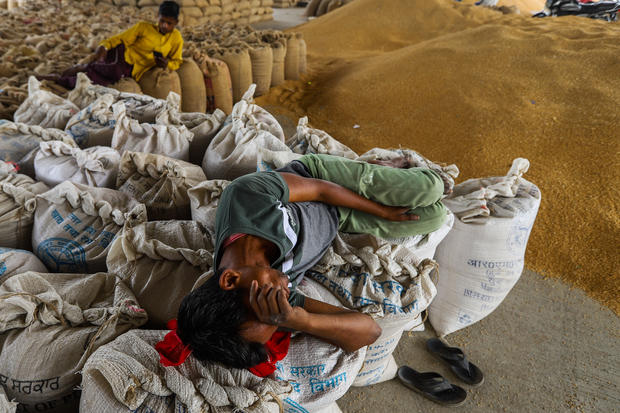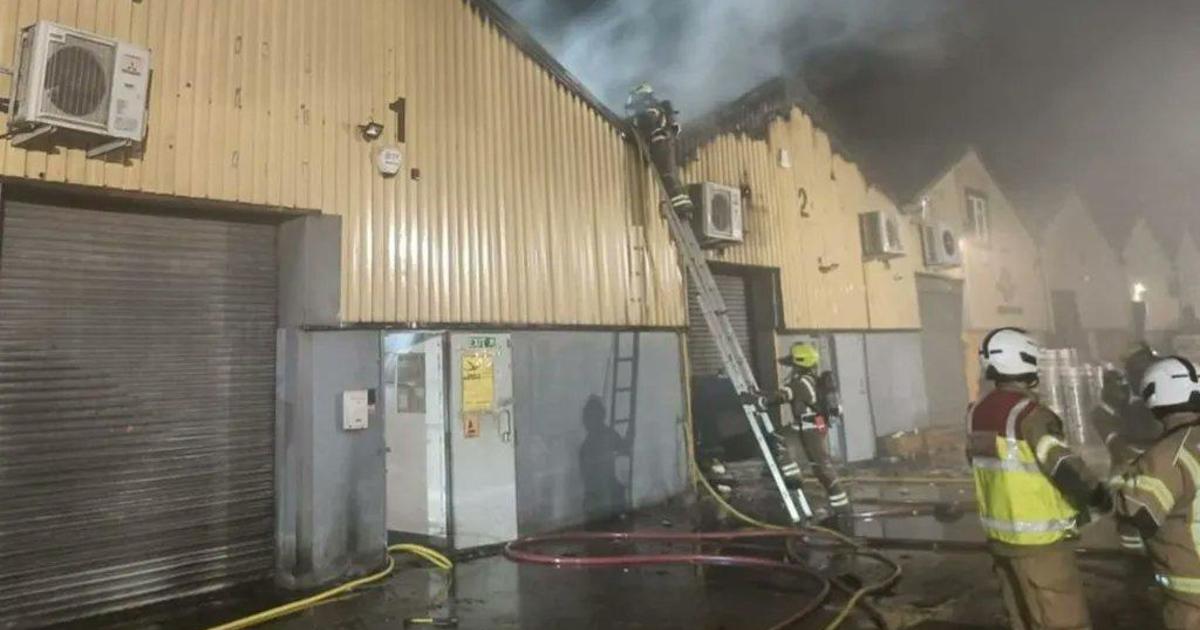Wheat prices hit record high as India's heat wave-driven export ban compounds Ukraine war supply woes
New Delhi — India's recent decision to severely restrict wheat exports amid a devastating heatwave has driven up global prices for the basic commodity to record levels, and drawn warnings of looming food shortages around the globe. The price of wheat futures rose by 5.9% Monday to touch an all-time high of $12.68 per half bushel in Chicago, before recovering slightly on Tuesday.
In the European market, the price rose to 436.25 euros per ton — up 4.68% during the day's trading.
The price of the food staple has risen more than 60% this year for several reasons, but largely due to disruptions caused by the war in Ukraine. Together, Russia and Ukraine — long known as the "bread basket of Europe" — have accounted for almost a third of the world's total wheat exports in recent years. Fertilizer shortages and poor harvests have contributed to the rising prices.
The government in India, the world's second-largest wheat producer after China, banned private exports of wheat on May 13, saying the move was necessary to manage national food security amid the threat presented by the severe heat hitting the country.
An early, prolonged heat wave has sent temperatures soaring over 120 degrees Fahrenheit, killed dozens of people in India and Pakistan since March, and taken a huge toll on crops.
Last week, Indian climate scientist Vimal Mishra told CBS News that the current heat wave was "just a snapshot of what we will see in the next 20 to 30 years" if humanity doesn't act fast to slow the rate at which the Earth's climate is warming. He predicted that heat waves would become more frequent, last longer, and be more severe in the years to come.
India has produced bumper wheat crops over the last five years and was aiming to export a record 10 million tons in 2022. The heat wave, and the export ban sparked by it, have disappointed commodity traders who'd hoped that Indian exports could at least partially make up for the shortfall caused by the Ukraine war.
India has exempted "neighboring and other vulnerable countries" from the ban "to meet their food security needs," and leaders stress that it could be reversed if the food security picture improves, but the move is still drawing criticism.
"If everyone starts to impose export restrictions or to close markets, that would worsen the crisis," German food and agriculture minister Cem Ozdemir said at a meeting of Group of Seven (G-7) agriculture ministers this week in his country.
Indian economist Ashok Gulati called India's wheat export ban a "knee-jerk reaction" by the government in New Delhi, and an "implicit tax" on the country's own distressed farmers.
But Devinder Sharma, India's leading agriculture expert, defended the government's export ban, arguing that the country must ensure it has enough food for its 1.4 billion people before it sells wheat abroad.
"Look at what the heat wave did to our crops this time," Sharma told CBS News. "Who will be responsible if [monsoon] rains wreak havoc, too, or if some other climate factors hit our production next year?"
Fears of famine, and recession
Global food prices have risen about 30% over the past year, according to the United Nations. That, along with rising fuel and energy prices, is driving up inflation around the world. And that has raised fears of famines and social unrest in poorer countries, where millions of people are already not getting enough food.
Some experts are already warning that the confluence of circumstances could push wealthy nations, including the U.S., into recession.
On Sunday, Lloyd Blankfein, the senior chairman of Goldman Sachs, told CBS' "Face the Nation" there was a "very, very high risk" of recession in the U.S.
The U.S. Department of Agriculture, in its first "World Agricultural Supply and Demand Estimates" report issued last week, forecast a decline in wheat production for the next two years.
"Food security will be increasingly affected by projected future climate change," the U.N.'s Intergovernmental Panel on Climate Change (IPCC) said in its latest report, adding: "Low-income consumers are particularly at risk, with models projecting increases of up to 183 million additional people at risk of hunger… compared to a no climate change scenario."




